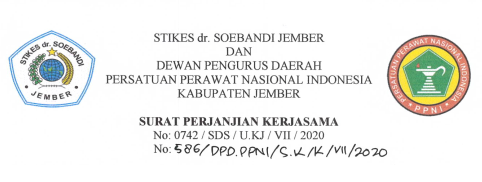The Influence of Parity Status on Mother's Behavior in Providing Exclusive Breastfeeding
DOI:
https://doi.org/10.36858/jkds.v13i1.738Keywords:
Exclusive Breastfeeding, Influence, Maternal Behavior, Parity StatusAbstract
Breast milk is the initial and primary source of nutrition for babies, and exclusive breast milk has been advised by WHO to be given to babies until they are 6 months old. It has been proven that exclusive breastfeeding reduced up to 30,000 infant deaths in Indonesia and 10 million infant deaths in the world. The objective of this research was to discover the effect of parity status on maternal behavior in providing exclusive breastfeeding to babies. This study is quantitative cross-sectional research using purposive sampling technique that involved 100 respondents in total. The research instrument was a questionnaire given to respondent’s door to door. Data processing was carried out univariate and bivariate using linear regression statistical tests. The results of the study showed that the majority of respondents did not provide exclusive breastfeeding amounting to 78% and the majority of parity status was multiparous with a total of 63%. while the results of bivariate analysis with Linear Regression test showed a p-value of 0.015 (α <0.05) indicating that there is an influence of parity status on maternal behavior in providing exclusive breastfeeding. Parity status of mother influences exclusive breastfeeding behavior, with higher parity status showed a reduced likelihood of the mother in providing exclusive breast milk. To increase exclusive breastfeeding coverage, midwives should also promote family planning programs especially to those with higher parity status to encourage exclusive breastfeeding.
References
Aceh, D. (2020). Profil Kesehatan Aceh. Dinkes Aceh.
Ervina, A., & Ismalita, W. (2018). Hubungan Paritas Dengan ASI Eksklusif pada Bayi Usia 7-12 Bulan. Jurnal Obstretika Scienta, 6(1), 170–178.
Fitri, D. I., Chundrayetti, E., & Semiarty, R. (2014). Hubungan Pemberian ASI dengan Tumbuh Kembang Bayi Umur 6 Bulan di Puskesmas Nanggalo. Jurnal Kesehatan Andalas, 3(2).
Hastuti, B. W., Machfudz, S., & Febriani, T. B. (2015). Hubungan Pengalaman Menyusui Dan Tingkat Pendidikan Ibu Dengan Pemberian ASI Eksklusif Di Kelurahan Barukan, Kecamatan Manisrenggo, Kabupaten Klaten. JKKI: Jurnal Kedokteran Dan Kesehatan Indonesia, 179–187.
Indriani, D., Kusumaningrum, R. Y., Nurrochmawati, I., & Retniningsih, T. (2022). Pengaruh Paritas, Pekerjaan Ibu, Pengetahuan Dan Dukungan Keluargaterhadap Pemberian Asi Eksklusif Pada Ibu Bayi. Jurnal Bidan Pintar, 3(1).
Kemenkes, R. I. (2021). Profil Kesehatan Indonesia 2020. Kementrian Kesehatan Republik Indonesia, 139.
Mabud, N. H., Mandang, J., & Mamuaya, T. (2014). Hubungan Pengetahuan, Pendidikan, Paritas Dengan Pemberian ASI Eksklusif di Puskesmas Bahu Kecamatan Malalayang Kota Manado. Jidan (Jurnal Ilmiah Bidan), 2(2), 51–56.
Maulidiyah, L. M., & Asthiningsih, N. W. W. (2021). Hubungan Paritas Ibu dan Promosi Susu Formula dengan Pemberian ASI Eksklusif pada Bayi Usia 6-12 Bulan di Posyandu Harapan Baru Samarinda. Borneo Studies and Research, 2(3), 1576–1583.
Mustika, D. N., Nurjanah, S., & Ulvie, Y. N. S. (2020). Buku Ajar Asuhan Kebidanan Nifas ASI Eksklusif. Universitas Muhammadiyah Semarang.
Novembriany, Y. E. (2022). Faktor Yang Mempengaruhi Ketidakberhasilan Pemberian ASI Eksklusif Di Puskesmas Tamban Kabupaten Barito Kuala Tahun 2022. Jurnal Keperawatan Suaka Insan (JKSI), 7(1), 44–48.
Organization, W. H. (2021). The Network For Improving Quality Of Care For Maternal, Newborn And Child Health: Evolution, Implementation And Progress: 2017-2020 Report.
Purnamasari, D., & Khasanah, R. N. (2020). Hubungan Paritas Dengan Pemberian ASI Eksklusif Di Rumah Konseling Banyuwangi Tahun 2020. Healthy, 9(1), 71–76.
Riskesdas, K. (2018). Hasil Utama Riset Kesehata Dasar (RISKESDAS). Journal of Physics A: Mathematical and Theoretical, 44(8), 1–200.
Setyorini, R. N., Widjanarko, B., & Sugihantono, A. (2017). Faktor-faktor yang Mempengaruhi Perilaku Pemberian Air Susu Ibu (ASI) Eksklusif di Wilayah Kerja Puskesmas Pegandan Kota Semarang. Jurnal Kesehatan Masyarakat (Undip), 5 (3), 620–628.
Sholihah, K., & Warsani, Z. (2023). Peningkatan Pengetahuan Ibu Tentang Pentingnya Asi Eksklusif Melalui Program Promosi Kesehatan Di Desa Aikperapa. Jurnal Kesehatan Tambusai, 4(3), 4426–4432.
Wahyuni, S., Madeni, B., & Hasritawati, H. (2022). Studi Kualitatif: Faktor Yang Mempengaruhi Kegagalan Pemberian Asi Eksklusif Pada Bayi Usia 0-6 Bulan Di Wilayah Kerja Puskesmas Bebesen. Femina: Jurnal Ilmiah Kebidanan, 2 (1), 83–95.
Downloads
Published
How to Cite
Issue
Section
License
Copyright (c) 2025 Jurnal Kesehatan dr. Soebandi

This work is licensed under a Creative Commons Attribution-NonCommercial-ShareAlike 4.0 International License.




